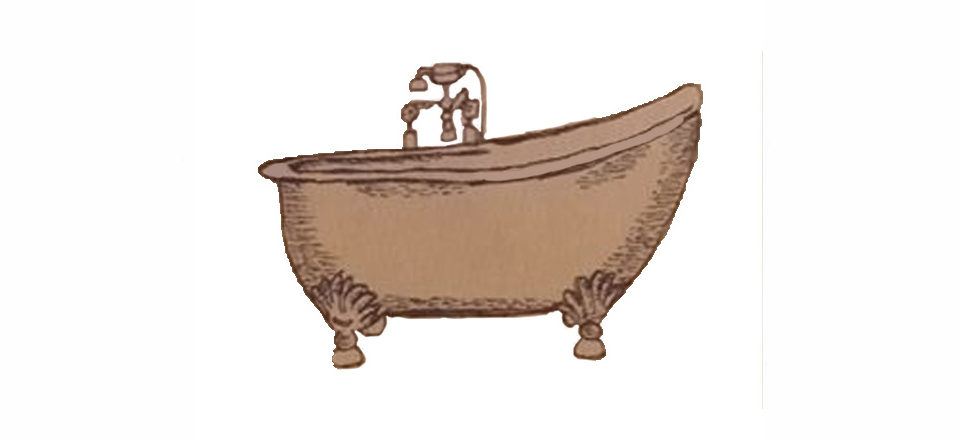
By Rose Hartley
This story was the joint runner-up of Right Now’s Fiction Competition, judged by Anna Funder and Tony Birch. Read the shortlist here.
The bathtub was made of heavy cast iron, coated in chipped white enamel. It wasn’t one of those lighter replicas they make for trendy vintage-style bathroom renovations. It was the real deal, a relic from the 1800s, and it weighed a ton. How it ended up on the footpath outside my house was a mystery, because it must have taken at least four people to lift the thing, and certainly nobody told me they were gifting me a free bathtub. My neighbours eyed me disapprovingly from their front yards. I’m sure they didn’t believe me when I said I didn’t put it there.
Roger, who lived in the double fronted Victorian next door collared me as I was coming home from work a few days later. He was a wealthy, rotund guy, the kind of guy who mentions that he’s just bought a bottle of Chateau d’Yquem Sauternes for $800, and was planning to drink it at Christmas. He’d always been extra nice to me, taking care to mention that his favourite cousin was a lesbian and had a lovely life partner who earned a bomb working for Moet & Chandon.
“That bathtub,” he began, and frowned at me. No further words necessary.
“I’ll book in a hard rubbish collection,” I told him meekly.
I phoned the council as soon as I stepped inside. Joanie rolled her eyes when she heard me on the phone saying thank you, yes please, oh is that right, oh that’s no problem, great, excellent, thank you, thanks.
“They’re not doing hard rubbish on demand anymore,” I said after I hung up.
“Well what are we supposed to do with the bathtub?” she asked.
“They’re doing the whole suburb on one day, the 23rd of December. They’ll pick it up then with the other stuff.”
“In six weeks?” Joanie shrugged in annoyance. Her black hair was coiled around her neck like a glossy piece of liquorice. I spread my hands in defeat. Nothing I could do.
Ruby moved in a week later. In the morning I left for work, stepping around the bathtub by the front gate, where it sat clean and empty. In the afternoon, when I returned, there she was, lolling about in the tub as languid as you please. Her face was crisscrossed with deep wrinkles, tramlines spreading wildly in all directions, her teeth hanging on in some parts of her mouth, while in other parts her gums were blackened and empty. Her arms, draped over the sides of the tub, were like soggy cinnamon sticks.
I stopped. Normally I don’t talk to strangers. Or at least, I don’t begin the conversation. Usually I wait for Joanie to introduce herself while I stand next to her, like she did with all our neighbours when we moved in six months ago. But Joanie was still at work, and a stranger was in the bathtub in front of my house. I would have to walk around her to get to my gate. It would be rude to ignore her. I felt my cheeks flush and my heartbeat jump. The woman was staring at me, unperturbed. I held out a slightly shaking hand, before remembering that you’re supposed to say hello first.
“Hello,” I said. “My name is—”
“This place is going to shit,” she said.
The venom in her voice was too much for me. I scuttled around her, trying not to look as if I was running away but still moving as quickly as I could. I entered my house and closed the front door softly.
An hour later, Joanie came home. She dumped her handbag on the counter.
“We have a new neighbour,” she said.
“Yes. I tried to introduce myself.”
She raised her eyebrows. “Really? I’m impressed.”
“It wasn’t impressive.”
“I talked to her. Her name’s Ruby. She told me she was the Queen of England. I’m not sure if she was testing me or not.”
“Testing you?” I asked. Joanie was a student counsellor, wise on such things.
“She could be schizophrenic, or she could just be taking the piss. Either way, she’s here to stay. Did you see her tarpaulin?”
“No.” I was too busy scuttling away, a frightened crab.
“Well, she’s chosen a nice street for it,” Joanie said. Our street was quiet and clean, shaded by mature plane trees. “Wonder how long it will take for Roger to call the police.”
“He wouldn’t do that.”
“He would.” Joanie set her mouth.
Roger never called the police. Joanie had a quiet word to him, invoking phrases that galled him, such as “highly vulnerable” and “lack of social housing” and “the right to dignity”. I thought she sounded a little self-righteous, but she assured me it was the only way to get through to him.
“I feel dirty,” she told me later. “But the only way to get these people to do the right thing is to make them think you’re judging them.”
Later I heard Roger repeating Joanie’s phrases to Mrs Westhill in number 102, one hand resting pompously on his hip, the other on her front gate. Word must have got around, because the rest of the neighbours ended up nodding to Ruby courteously when they passed, or ignoring her altogether. I saw some of them observing her from ornate lace balconies after dinner, as she mumbled to herself quietly.
Ruby snapped her fingers at me as I walked past her towards the train station. I doubled back to stand before her bathtub, keeping a good metre or two between us. I’d caught a whiff of dead possum. I was a little ashamed of myself for feeling repelled by her. She lived in a bathtub, but that didn’t mean she could wash herself. Somewhere on her person she must have had a tube of lipstick, and the fatty stain on her lips was the exact colour my elegant little grandmother used to wear. Her mouth parted into its habitual red cavern, and I braced myself.
“This place is going to shit,” she said. “The terrorists are coming. In two years there’ll be none of us left.”
“Us?”
“You. Me. All of us.” Abruptly she changed the subject, waving a thin hand. “I heard you and Joanie want to get married.”
“Yes,” I replied, and told her about Joanie’s campaign. “She went to Parliament House. She made a speech, it was very good.” My handbag was pressing into my shoulder, making it ache. I shifted my weight onto my left foot and Ruby narrowed her eyes at me as if I was about to scoot away.
“Bill didn’t get through though, did it.”
“No, we didn’t expect it to. It’s a long road.” I repeated Joanie’s words without thinking.
Ruby nodded and smacked her lips.
“It’s fags like you that are ruining the country,” she said.
I thought of Rab, my old school friend who used to smoke a lot of weed. He’d had a psychotic episode at uni and wound up with acute schizophrenia, tied down in a psychiatric ward. When I went to visit him he’d seemed small and frightened, side by side with the criminally insane. I wondered if Ruby had ever seen the inside of one of those places. When they show them on TV the wards look so hygienic and orderly, and they are in a way, but until you go there you’ll never know the feeling of chaos bubbling through the halls, between the beds, so strong it’s almost visible, like humming copper wire.
“Howard’s the only one with any sense,” Ruby continued. “Jailing those ragheads before they take over.”
“Do you mean Abbott?” I asked.
“Yes, of course, that’s what I said,” she snapped.
Her rubber lips sunk closed and she blinked slowly, and I took the chance to slink away from her.
That night I brought her a baked potato wrapped in foil. Joanie doesn’t eat potatoes because of the starch, but I always cook one for her in case she decides to change her mind. I took it to Ruby in the evening dark and left it under the rim of the bath while she slept. I didn’t want her to see me, because when Joanie had offered her food earlier Ruby had snapped that she wasn’t a bum and wouldn’t be treated as one. But I didn’t know how else she got a feed, and she was so thin. Perhaps she lined up at the meals van on The Avenue during the day, but I never saw her leave her tub and couldn’t be sure.
I looked back at the silver-wrapped boulder shining beneath the tub in the cool night air, and chided myself that I didn’t think to leave a paper plate or a fork. Next time, I thought.
I started leaving for work ten minutes earlier than usual to accommodate Ruby’s need to fill my ear with her views on modern culture and politics. But this morning she wanted to talk about herself. She had found a child’s necklace, the kind made of fake heart-shaped lollies on a string. She reached out a hand to me as I passed, her fingers clutching the pastel-coloured hearts.
“I was a good catch,” she said. “Good family. And I was beautiful.”
I paused to catch my breath. She seemed to want me to ask questions, and I wanted to ask them. Her mouth was slack but her eyes were boring straight into mine. I searched for an appropriate question. Don’t ask her how she ended up here, it’s demeaning. Don’t ask her about her family, it might make her sad. Too much time was passing and the look on her face was turning defiant, as if she thought my silence was disbelief that she could ever have been beautiful. I needed to say something, so I timidly asked her if she’d ever been married.
“Three times,” came the answer. “Why, are you interested?” She cackled and winked.
“I thought you didn’t like fags,” I said.
“Well, you look like a man, anyway,” she said. She leaned back in the tub. “The marches your girlfriend does, the speeches. Wanting fags to be able to marry. Isn’t it all to prove something to her family?”
I was startled, not only at Ruby’s sudden clarity, but the way she seemed to have Joanie pegged. Joanie’s parents were Catholic, the old school kind of Catholics who referred to us as “homosexuals” and kept their daughter’s girlfriend a secret from their friends.
“What do you mean?” I said.
“You know, ‘look Ma, I’m married, fuck you’, that sort of thing.”
“I don’t know,” I said. I’d wondered that before, but I’d never said it out loud.
The neighbours organised a street party two weeks before Christmas, and Ruby demanded that we fill her bath with champagne. Joanie and I went to the bottle-o but Joanie forgot her wallet, and I only had enough money to buy three bottles of Passion Pop. We poured the stuff in anyway. After the fizzing subsided, the liquid barely covered a few centimetres of the tub and only served to form a slushy brown liquid on the bottom, the bath having accumulated a layer of dirt in the last few weeks. Ruby threw off her clothes and splashed around in the sludge, her wrinkly breasts flopping up and down like a pair of football socks.
I guess one day Joanie and I will look like that, I thought. I looked over at Joanie, talking passionately to Oscar, the man who lived across the road and grew the healthiest lemon trees in his front yard that I’d ever seen. I heard the words Christopher Pyne and flinched. Joanie was so beautiful when she was angry. Her dark eyebrows could hold more tension than a bullwhip.
I took a sip of my lemon squash and looked over to see what the neighbours made of Ruby’s nudity. Some were eyeing her naked body with blank horror, others with fragrant distaste. Most of them averted their gaze, muttering to each other. Roger approached her, staring fixedly at the fence to Ruby’s left, and with a forced effort at heartiness wished her a merry Christmas. I wanted to fling myself over the bathtub and cover her with my own body, but I wasn’t sure if I wanted to make them stop looking at her, or stop pretending not to see her.
The day of the hard rubbish collection, Joanie attended a rally for marriage equality, where people would be marching to Parliament House, again. She’d lost her temper at me that morning when I’d asked her if she thought it was really worth it.
“Is it worth what?” she’d snapped.
I felt my cheeks flush. “The pain. Having them reject us, vote it down.”
The bullwhips came together on her face in a way that was frankly frightening. “You think we should give up because being rejected is painful? That’s pathetic.”
“You’re right,” I said. “I’m sorry.”
“If you’re trying to tell me that you don’t want to marry me…”
“No, no. No. That’s not…sorry.”
She left in silence.
The neighbours were clearly anticipating hard rubbish day. A couple of old televisions, toasters and boxes of books lined the footpath, but that wasn’t what they were interested in. We all wanted to know what they’d do with Ruby. In her eagerness to prepare her speech for the rally, Joanie had forgotten, and I hadn’t thought to remind her. When the men turned up in their truck to collect the rubbish, I wished I had.
Two men in dark grey uniforms got out of their truck and began collecting the items, shoving them in the truck with grunts and thumps. After they hauled the broken air hockey table in, they looked at Ruby dozing in her bathtub. My heart started striking the inside of my rib cage. Ruby was out to it, the skin around her open mouth like finely wrinkled linen.
The two blokes consulted each other, and one of them walked over and shook her. I could tell by the way he leaned back that he didn’t like her smell. She didn’t wake. I took half a step forward from my position at my front gate. Roger, observing from his front yard, gave me a stern look. He wanted me to stay out of it. If only Joanie were here, I thought. She would know what to say. I needed Joanie to speak for me, for Ruby. I never could stand up to authority without her next to me. But Joanie could convince almost anyone that she knew the difference between right and wrong.
The bloke who’d shaken Ruby got a bottle of water from his truck and splashed it over her face. She woke with a roar that brought half the street to their doors. Pretty soon at least twelve people were gathered on the footpath, watching the hard rubbish guys trying to force Ruby out of her tub. Ruby shouted and swore, struggling against the bloke and scratching his arms. Finally he gave up and made a phone call.
Finally, I cleared my throat. Took a deep breath. “Perhaps you should leave her there,” I whispered. Nobody heard me.
A few minutes later a police paddy wagon pulled up. A man and a woman in uniform got out of the car and approached Ruby, who cowered in her tub, clutching the rim so tightly her hands turned white. I wanted to step forward, but my feet were frozen to the footpath. Roger saw me twitch and came over.
“Now, look,” he said in a low voice, looking down at me in an indulgent way, like we were in on some secret together. “I’ve spoken to the council about her. Essentially her bathtub is a semi-permanent dwelling, and we’d need council permission to let her stay. This is a heritage listed street.” I could hardly understand what he meant. “I know you’re fond of her. But she needs proper medical help. She’s mentally unwell.”
The two police officers lifted Ruby out of the bath and carried her, screaming and spitting into the back of the paddy wagon. They slammed the doors and drove away, leaving the hard rubbish men free to dispose of her bathtub.
The excitement over, my neighbours scattered, closing their heavy wooden doors gently, courteously. I stayed behind, a lone witness.
The two men couldn’t lift the tub. It must have weighed well over a hundred kilos. I sat on my front veranda and waited. It was a clear, warm morning. After some discussion, they left, returning an hour later with a sledgehammer. I was the only one watching when they shattered the cast iron tub with eight or nine heavy blows, tossed the pieces into the truck and drove away.
Rose Hartley is an Adelaide writer whose first novel (working title “The Caravan“) is currently shortlisted for Varuna’s Publisher Introduction Program. In 2013, her alter ego Florence Child was runner up in the inaugural 457 Prize for Poetry. Rose’s short fiction has appeared in the Adelaide Fringe WORD anthology and the University of Melbourne creative writing anthology. She also writes for Saturn Program, a collaborative art/music/writing project with Melbourne producer Cosmo Black. Read her blog and follow her on twitter @theRosamond.



